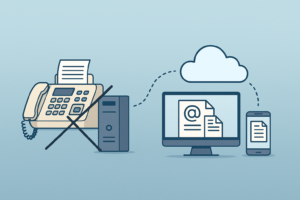Fax over IP plays an integral role in avoiding the many issues that can arise when people use outdated technology. Many companies today struggle because the devices they use for critical business tasks are out of step with the realities of today's digital world. In the same way that one wouldn't rely solely on an office landline in the age of mobility, continuing to use fax machines to transmit vital information risks limiting, lengthening and imperiling communications capacity. FoIP is part of a unified communications solution that puts these issues in the rearview mirror.
Despite the emergence of game-changing, simple and cost-effective communications solutions that satisfy the whole spectrum of interactive and interoperable needs, many organizations continue to let themselves be weakened by outdated systems. Here are four common communications "fails" – and how FoIP can help solve them.
- Systemic latency: Today's enterprise technology environments are complex ecosystems. Latency or inadequate performance in one task can affect operational productivity in other areas. This is especially true if a problem isn't an isolated incident, but a recurring issue. Information Age contributor Ben Rossi wrote about the pervasive problem of the "message in a bottleneck" – companies relying on communications equipment that had their heyday when The Police were "sending out an SOS." It takes about eight minutes to send a fax with a traditional fax machine. Meanwhile, other interactions are operating in real time. FoIP enables transmission of important documents to operate at the same real-time speed of other communications – avoiding system-wide bottlenecks.
- Equipment outages: Fixing broken down hardware can be a significant budgetary problem – especially if the organization relies on older equipment to work at modern capacities. Today's Internet-based communications enable companies to cut down on downtime stemming from equipment failures, the impact of which can reverberate around the organization. FoIP eliminates the need for expensive and headache-inducing asset lifecycle management.
- Security vulnerabilities: Cyberthreats seem to get stronger every week, making the damage from a data breach ever more expensive and hard to reverse. Particularly for organizations in the healthcare, financial and logistics industries, a variety of compliance standards and protocols make virtually every aspect of sharing important documents governable. FoIP services offer protection for compliance standards such as the Health Insurance Portability and Accountability Act as well as providing more visibility for the supply chain, helping to shield organizations with a modern security system that counters today's most insidious threats.
- Lack of client trust or consumer loyalty: Communications are critically important to establishing meaningful connections with clients and customers, especially as the digitally-savvy millennial generation becomes a huge segment of the workforce and the consumer base. Ineffective communications processes can directly contribute to suspicion or a lack of trust, wrote TMCnet contributor David Vaughan. A business that is perceived as unable to "get with the program" – even if it's just measured by their lack of modern communications tools – can have its other characteristics called into question. Having any of the above problems – regular system sluggishness or persistent protection issues – make an organization look unreliable and out of touch. FoIP is part of a unified communications effort that modernizes, consolidates and enhances a company's ability to build positive business and consumer relationships.




